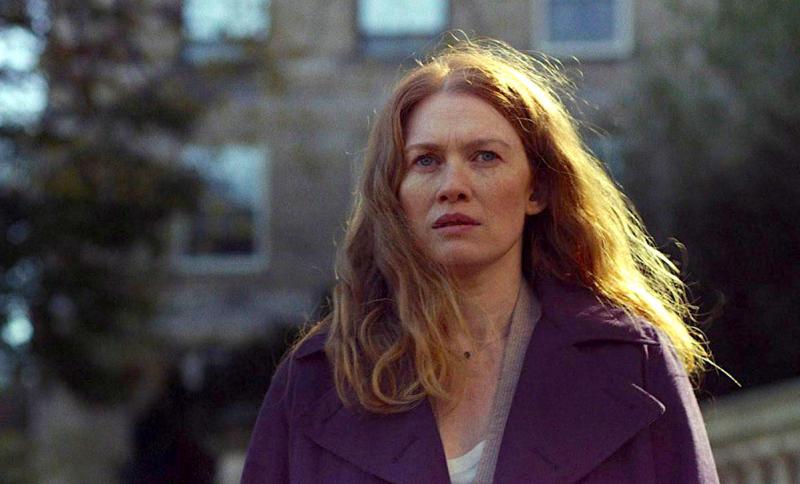Never Here review - conceptual art may damage your health | reviews, news & interviews
Never Here review - conceptual art may damage your health
Never Here review - conceptual art may damage your health
Echoes of Hitchcock haunt debut feature about voyeurism and obsession

Beware the hidden powers of the cellphone.
Miranda comes out with fatuous nuggets of pseudobabble like “circumstances are the dictators of my work”, but it seems she’s managed to upset the karmic balance within her previously cosy little sphere of activity. When a woman – one of her neighbours, as it turns out – is assaulted in the street outside her apartment building, the event is witnessed by her lover and art dealer Paul Stark (Sam Shepard, pictured below, quietly authoritative in his final film role). Paul is married to an invalid wife, and to protect him Miranda claims to the police that it was she who saw the attack. This puts her in the absurd position of describing the attacker from Paul’s description of him, and then attending a police line-up to identify a suspect she’s never seen.
However, never satisfied with a silly idea when she could embrace a really stupid one instead, she becomes intrigued by one of the men in the line-up parade after she thinks she’s seen him at her exhibition. She starts following him around the city obsessively with her video camera, treating the viewer to episodes of wobbly stalker-vision in the process. Miranda, the artist-as-vampire, decides he must become the subject of her next “project”.
 If you think none of this looks likely to end well, you’re on the right track. Miranda’s life starts to slide into a Hitchcockian twilight of mysterious intruders and misleading identities, where it isn’t clear whether she’s truly in peril or whether she’s experiencing some sort of psychological disintegration. Perhaps both. Director Camille Thoman, making her feature film debut, doesn’t hide her debt to ol’ Hitch, and as well as including a clip from The Lady Vanishes has named one of her characters after its star Margaret Lockwood.
If you think none of this looks likely to end well, you’re on the right track. Miranda’s life starts to slide into a Hitchcockian twilight of mysterious intruders and misleading identities, where it isn’t clear whether she’s truly in peril or whether she’s experiencing some sort of psychological disintegration. Perhaps both. Director Camille Thoman, making her feature film debut, doesn’t hide her debt to ol’ Hitch, and as well as including a clip from The Lady Vanishes has named one of her characters after its star Margaret Lockwood.
Themes of voyeurism and intimate violations of private spaces help to raise the emotional temperature, while Thoman’s knack of shooting her actors so their identity remains tantalisingly ambiguous amplifies the sense of unease and insecurity. “I am disappearing, Andy,” wails the desperate Miranda to her detective-boyfriend Andy Williams (Vincent Piazza), whose investigation of the assault case gives the narrative an additional twist. James Lavino’s creepy, fragmented piano score feels subtly unhinged, and Einos skilfully imparts the sense of a woman cllnging to a cliff edge by her fingernails.
Thoman’s film doesn’t help itself with intermittent lapses into the perverse and the impenetrable rather than the merely mysterious, and at 110 minutes it’s crying out for a trim. There’s something about it that keeps you hanging in there, though.
Watch the trailer to Never Here
The future of Arts Journalism
You can stop theartsdesk.com closing!
We urgently need financing to survive. Our fundraising drive has thus far raised £49,000 but we need to reach £100,000 or we will be forced to close. Please contribute here: https://gofund.me/c3f6033d
And if you can forward this information to anyone who might assist, we’d be grateful.

Subscribe to theartsdesk.com
Thank you for continuing to read our work on theartsdesk.com. For unlimited access to every article in its entirety, including our archive of more than 15,000 pieces, we're asking for £5 per month or £40 per year. We feel it's a very good deal, and hope you do too.
To take a subscription now simply click here.
And if you're looking for that extra gift for a friend or family member, why not treat them to a theartsdesk.com gift subscription?
more Film
 The Mastermind review - another slim but nourishing slice of Americana from Kelly Reichardt
Josh O'Connor is perfect casting as a cocky middle-class American adrift in the 1970s
The Mastermind review - another slim but nourishing slice of Americana from Kelly Reichardt
Josh O'Connor is perfect casting as a cocky middle-class American adrift in the 1970s
 Springsteen: Deliver Me From Nowhere review - the story of the Boss who isn't boss of his own head
A brooding trip on the Bruce Springsteen highway of hard knocks
Springsteen: Deliver Me From Nowhere review - the story of the Boss who isn't boss of his own head
A brooding trip on the Bruce Springsteen highway of hard knocks
 The Perfect Neighbor, Netflix review - Florida found-footage documentary is a harrowing watch
Sundance winner chronicles a death that should have been prevented
The Perfect Neighbor, Netflix review - Florida found-footage documentary is a harrowing watch
Sundance winner chronicles a death that should have been prevented
 Blu-ray: Le Quai des Brumes
Love twinkles in the gloom of Marcel Carné’s fogbound French poetic realist classic
Blu-ray: Le Quai des Brumes
Love twinkles in the gloom of Marcel Carné’s fogbound French poetic realist classic
 Frankenstein review - the Prometheus of the charnel house
Guillermo del Toro is fitfully inspired, but often lost in long-held ambitions
Frankenstein review - the Prometheus of the charnel house
Guillermo del Toro is fitfully inspired, but often lost in long-held ambitions
 London Film Festival 2025 - a Korean masterclass in black comedy and a Camus classic effectively realised
New films from Park Chan-wook, Gianfranco Rosi, François Ozon, Ildikó Enyedi and more
London Film Festival 2025 - a Korean masterclass in black comedy and a Camus classic effectively realised
New films from Park Chan-wook, Gianfranco Rosi, François Ozon, Ildikó Enyedi and more
 After the Hunt review - muddled #MeToo provocation
Julia Roberts excels despite misfiring drama
After the Hunt review - muddled #MeToo provocation
Julia Roberts excels despite misfiring drama
 London Film Festival 2025 - Bradley Cooper channels John Bishop, the Boss goes to Nebraska, and a French pandemic
... not to mention Kristen Stewart's directing debut and a punchy prison drama
London Film Festival 2025 - Bradley Cooper channels John Bishop, the Boss goes to Nebraska, and a French pandemic
... not to mention Kristen Stewart's directing debut and a punchy prison drama
 Ballad of a Small Player review - Colin Farrell's all in as a gambler down on his luck
Conclave director Edward Berger swaps the Vatican for Asia's sin city
Ballad of a Small Player review - Colin Farrell's all in as a gambler down on his luck
Conclave director Edward Berger swaps the Vatican for Asia's sin city
 London Film Festival 2025 - from paranoia in Brazil and Iran, to light relief in New York and Tuscany
'Jay Kelly' disappoints, 'It Was Just an Accident' doesn't
London Film Festival 2025 - from paranoia in Brazil and Iran, to light relief in New York and Tuscany
'Jay Kelly' disappoints, 'It Was Just an Accident' doesn't
 Iron Ladies review - working-class heroines of the Miners' Strike
Documentary salutes the staunch women who fought Thatcher's pit closures
Iron Ladies review - working-class heroines of the Miners' Strike
Documentary salutes the staunch women who fought Thatcher's pit closures
 Blu-ray: The Man in the White Suit
Ealing Studios' prescient black comedy, as sharp as ever
Blu-ray: The Man in the White Suit
Ealing Studios' prescient black comedy, as sharp as ever
